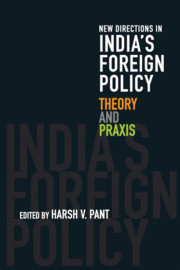Book contents
- Frontmatter
- Contents
- Preface
- 1 Introduction
- Part I Theoretical Evolution
- Part II Emerging Themes
- 7 Non-Alignment and Beyond
- 8 India and Multilateralism: Concepts, New Trajectories and Theorizing
- 9 India and the Responsibility to Protect
- 10 India and the Indo-Pacific Discourse
- 11 India and Nuclear Deterrence
- 12 India and Its Diaspora
- Bibliography
- Contributors
- Index
9 - India and the Responsibility to Protect
from Part II - Emerging Themes
Published online by Cambridge University Press: 13 November 2018
- Frontmatter
- Contents
- Preface
- 1 Introduction
- Part I Theoretical Evolution
- Part II Emerging Themes
- 7 Non-Alignment and Beyond
- 8 India and Multilateralism: Concepts, New Trajectories and Theorizing
- 9 India and the Responsibility to Protect
- 10 India and the Indo-Pacific Discourse
- 11 India and Nuclear Deterrence
- 12 India and Its Diaspora
- Bibliography
- Contributors
- Index
Summary
India's response to the emergence and evolution of the doctrine of the Responsibility to Protect (R2P) – as well as its invocation in several recent crises – has generated a significant number of academic and policy-oriented studies. It has attracted the attention of scholars interested in the effects the so-called ‘rising powers’ might be having on the international system. It has piqued the interest of think tank analysts and serious journalists concerned with assessing New Delhi's approach to foreign policy, especially when it comes to the management of key bilateral relationships and the multilateral processes of global governance. And it has also become a focus for researchers analysing how foreign policy is made in India – on its core players, their beliefs and preferences, the institutional contexts in which they operate, and the pressures they experience from parliamentarians, interest groups, electoral politics, the military, or the media, amongst others.
India's complex relationship with R2P is, in other words, not simply interesting in itself, but also important in terms of what this emerging body of research tells us about India's contemporary international relations in general, and its changing foreign policymaking processes in particular. Moreover the work this topic has so far prompted provides a useful snapshot of the present state of scholarship on Indian foreign policy – a field often criticized as theoretically underdeveloped by global standards.
All the scholarship discussed in this chapter observes that the majority of India's foreign policymaking elite remains sceptical about key aspects of R2P and that a minority is straightforwardly hostile to some elements. They disagree, however, when it comes to explaining New Delhi's reluctance to embrace R2P, especially its so-called ‘third pillar’, which calls for international intervention in cases where states are manifestly failing to protect their populations. Some point to ideational factors, to the beliefs held by the policymaking elite, assuming that these drive Indian foreign policy preferences. Others point to domestic political imperatives, especially electoral politics and the challenges of managing ruling coalitions, as shaping India's approach to R2P. And still others argue that concerns over India's own handling of its internal security challenges underpin official scepticism about the doctrine.
- Type
- Chapter
- Information
- New Directions in India's Foreign PolicyTheory and Praxis, pp. 172 - 194Publisher: Cambridge University PressPrint publication year: 2019
- 1
- Cited by



